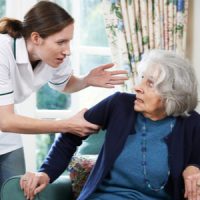Dementia and Nursing Home Abuse

One of the hardest decisions a person has to make is whether or not to put their elderly loved one in a nursing home. However, if a senior member of your family is diagnosed with dementia, they may need help throughout the day with tasks that they now find difficult. When you place your loved one in a nursing home, you expect that they will receive the attention they need and believe that they will remain safe from harm. However, if your elderly loved one is physically or emotionally abused in a nursing home, they may begin to act very differently or show physical signs of abuse. Learn to understand the differences between the progression of dementia and possible elder abuse.
Understanding Dementia
As people age, they may have a bit of memory loss, which is quite different than a diagnosis of dementia or Alzheimer’s disease. Some of the ways to tell if the newly developed memory issues are dementia include the following:
- If reminders work, then forgetfulness could be part of the aging process.
- If an elderly person forgets names and dates, and reminders are unhelpful, it may be dementia.
- If your senior loved one is unable to remember distinct memories from their past even with photographs as prompts it may be a sign of dementia.
- If your elderly loved one can not seem to remember how to do simple tasks such as using a telephone, bathe themselves, pay bills, or understand how a clock works, it may be dementia and not just forgetfulness.
- If there are strange reactions to normal questions or inappropriate or strange answers to questions, you may want to have your elderly loved one evaluated by a medical professional to determine if they may have dementia.
Dementia and Nursing Home Abuse
It is extremely important to keep constant vigilance on your elderly loved one if they have dementia and are placed in a nursing home. Oftentimes, elderly persons with dementia are much more susceptible to elder abuse and neglect. They may not understand what is happening to them, or remember that they were abused after the fact. Make sure to inspect your elderly loved one carefully when you visit, and notice if you find any unexplained bruises, injuries showing that they have been restrained, cuts, broken or fractured bones, dehydration or malnutrition, or strange reactions out of the ordinary to your questions. Additionally, if you notice that your elderly loved one has difficulty or pain standing or sitting or has a newly acquired sexually transmitted disease, they may have been sexually abused. If you suspect any kind of abuse, contact the management of the nursing home facility, Adult Protective Services, and the police.
Let Us Help You Today
If you believe your elderly loved one suffered any kind of abuse or neglect in a nursing home, contact a Columbia personal injury attorney at The Stanley Law Group at 803-799-4700 to help you build a strong case and help ensure your loved one receives the justice that they deserve.
Resource:
alz.org/alzheimers-dementia/what-is-dementia
https://www.thestanleylawgroup.com/signs-of-nursing-home-abuse/
